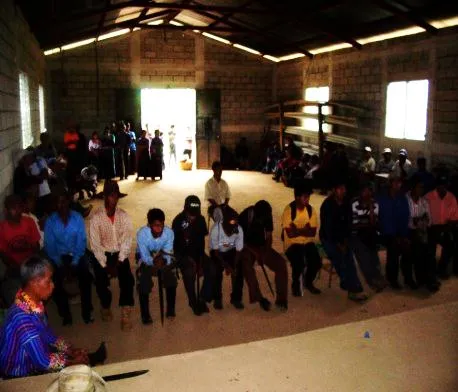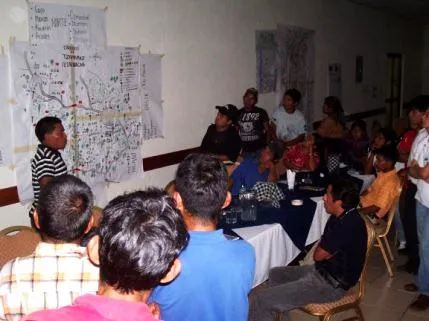Organization and participatory training of the Local Coordinators for Risk Reduction (COLREDs)

Organization and participatory training of the Local Coordinators for Risk Reduction (COLREDs), as a result of the Bio-rights project: linking community- and ecosystem-based approaches to disaster risk reduction.
The Bio-rights approach as a micro-loan system to promote ecosystem and community based DRR measures relies on a strong foundation in the communities. Trust, clear agreements, conditions, responsibility and ownership are believed to be elements needed for a good management of the funds, and support for the ecosystem based micro-projects.
In the project area of this innovation, the key actors in this are the Local Disaster Reduction Committees (COLREDs). The local team explains:
What are COLREDs? Local Coordinators (Committees) for Disaster Reduction, COLREDs, are Community Based Organizations of the communities (villages and townships), composed of men and women elected in community meetings and organized for the coordination and supervision of community activities to reduce disaster risks and emergencies response. They are social groups that are part of the National Coordinator for Disaster Reduction, CONRED, the levelled national system responsible for first response and DRR in Guatemala.
What is the role of the COLREDs in the Bio-rights methodology? The COLREDs have direct intervention in several phases of the Bio-rights methodology: development, contractual matters, implementation, monitoring and evaluation they are the legitimate spokespersons of the community in the identification and prioritization of micro-projects, will be responsible for the signing of contracts and of small projects involving environmental resources conservation activities, management of emergency funds and of disaster risk mitigation funds, in coordination with the Community Development Council, COCODE. Also, they implement activities to explore more opportunities through local partnerships and negotiating with potential buyers of environmental services, as this was identified as a potential for following up or up-scaling the Bio-rights activities.

To whom COLREDs direct their efforts? The COLREDs involved in the Bio-rights innovation direct their efforts to a total population of 1,625 persons belonging to ethnic group Maya K'iche', who live in the communities of Pakim, Pasaqajuyub, Tzamabaj and Chicorral, in Sololá.
The committee members were selected based on a small profile that takes into account the skills and abilities of each person, plus the requirement of the Executive Secretary CONRED as the supervisory body.
How is capacity of COLREDs being strengthened? Training of committee members is being developed based on methods and techniques of adult education (andragogy and popular education), which involves the use of posters, talks, reflections, drawings and ordered repetition of concepts and definitions, to training that has enabled the COLREDs to explain in their own words and drawings to the municipal authorities, the levels of hazard, vulnerability, capacity and risk in which they live. The trainings are also done in the Maya K’iche’ language, and with a learning process that goes from practise to theory.

What are the indispensable conditions in the contract between the Project and the COLREDs for implementation of the Bio-rights methodology? Traditional authorities are part of the structure of COLREDs, and as such guarantee that the Bio-rights model recognizes customary law of the beneficiaries with regards to the fund management, environmental resource conservation, adoption of contracts and sustainability of the process.
Moreover, the people who manage the credit receive technical assistance, and the stakeholders accept and sign related commitments: transparent management of funds, high quality soil conservation works, implementation of conservation plans and implementing ecosystem mechanisms that contribute to reduction of disaster risk and environmental degradation. The activities will be coordinated with COCODEs, since they are coordinating bodies and have a legal framework that allows them to promote integrated community development.
Stay updated
Sign up for our newsletter to receive regular updates on resources, news, and insights like this. Don’t miss out on important information that can help you stay informed and engaged.
Related articles


.png)
Explore Elrha
Learn more about our mission, the organisations we support, and the resources we provide to drive research and innovation in humanitarian response.